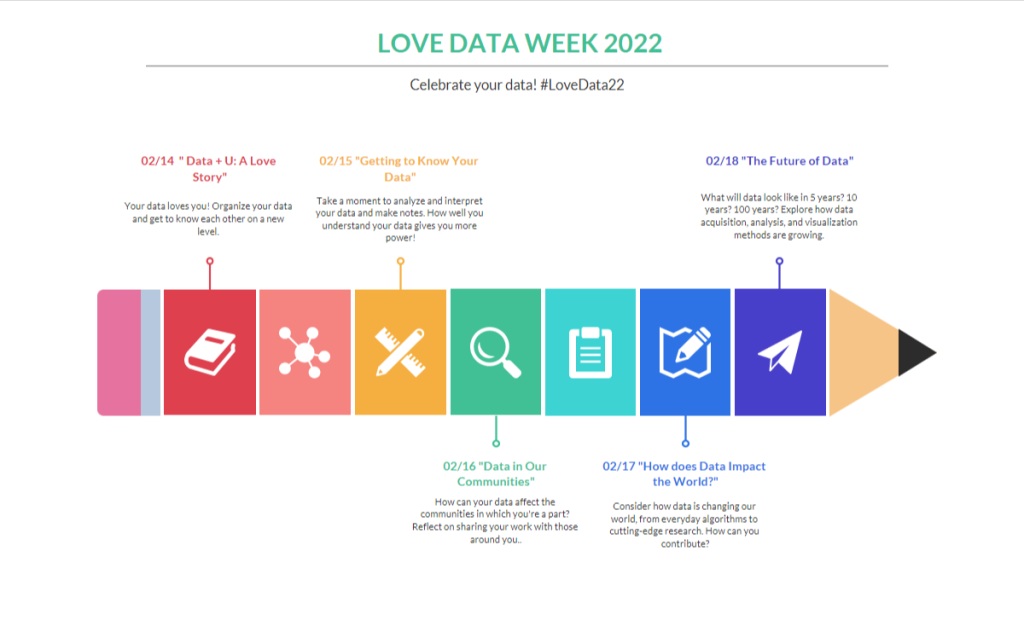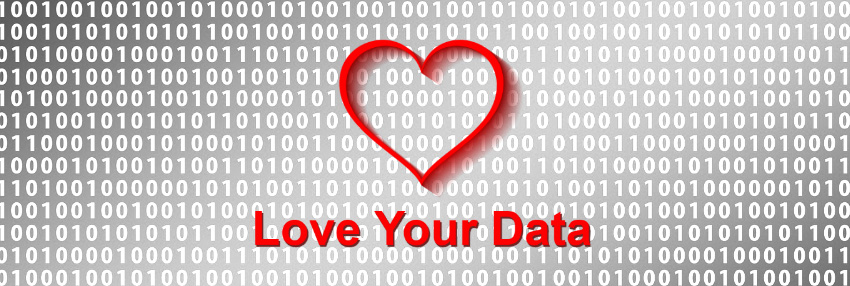Love Data Week 2022
All Libraries, Digital Initiatives, Scholarly Communications Posted: February 14th, 2022Data is everywhere, an ever-growing and pervasive feature from our everyday lives to cutting-edge research across a myriad of disciplines. According to Forbes, 2.5 quintillion bytes of data were generated daily, and as of 2018, 90% of all data gathered occurred between 2016 and 2018! Love (Your) Data Week is an annual celebration and ode to data acquisition, processing, analysis, and visualization. Individuals, academic, and research institutions can participate in data-related activities throughout the week to be a part of the changing landscape of data. Love Data Week 2022 is from February 14th-18th, 2022, and this year’s theme is “Data is for Everyone.” Given the technological revolution in which we are actively a part, it’s more vital than ever for individuals to come together with information that can help us better our world. Explore the information, resources, and activity ideas below during this year’s Love Data Week and share your knowledge with your communities. Together, we can make information streamlined and accessible for the future.
USE #LoveData22 ON SOCIAL MEDIA TO SPREAD THE DATA LOVE!

Feb. 14th: Data + U: A Love Story: Smile, your data loves you! Being passionate about outlining, storing, and revisiting your data helps develop a deeper understanding and appreciation of its value to the world. Don’t have data yet? Check out https://www.tableau.com/learn/articles/free-public-data-sets to get started with free data collection and visualization.
Feb. 15th: Getting to Know Your Data: If you want to love data, you have to know it. Consider the following tips about good practice when it comes to organizing and keeping track of your data:
- The 3-2-1 Rule: store 3 copies of each important file (1 main and 2 backup) in 2 different media types and maintain at least 1 copy offline.
- Check if your data and notes provide enough context for everyone working with them.
- Maintain clarity and be concise when recording data and notes.
- Dates should be labeled in the file name as YYYYMMDD.
- Avoid using special characters in a file name.
- Create and retain a file naming pattern and folder organization scheme and platform that works for you.
Feb. 16th: Data in Our Communities: Sharing data is essential to promoting information literacy and increasing the quantity of available knowledge. To ensure your data is accessible to both yourself and others, take a moment to check over your data following these good practice guidelines:
- If taking handwritten notes, write legibly and clearly cross out mistakes. Try to prevent erasing – you never know what notes you may need in the future.
- Number pages, especially if working with a long document and/or spreadsheet.
- Dates! Dates! Dates! When it comes to sharing data, time matters in situations involving grants, patents, and copyright, to name a few. Make sure to record the date in your notes and files.
- Review your work, and update current projects regularly. Ensuring your data is up-to-date improves its quality and legitimacy. Checking for errors when reviewing is also a good habit. Most organizations recommend keeping data for at least seven years upon completion of a project, just in case.
Once your data is organized and stored safely, it has the power to influence the local communities and settings in which you play an active role. Information holds power, and learning how to visualize and utilize it are the next steps.
Feb. 17th: How does Data Impact the World?: We know information is a powerful tool, but how can it be maximized in both quality and quantity? Data is subliminal in the algorithms we use daily, and overt in our interactions with it, such as dealing with financial information. An infographic from The Visual Capitalist details the famous “Internet Minute” for 2021, showing the sheer amount of information generated in one minute across the Internet. Today, take some time to reflect on how the information you acquire and share your data with peers, organizations, and even the world. Remember these tips when it comes to exporting and sharing your data with the world:
- Release data upon publication in an accessible file format (i.e. .islx, .csv, .docx).
- Take steps to license your data.
- Store your data in an institutional repository for long-term open access. Find out tracking features for the repository you choose.
- Create and share a citation in your desired/necessary format.
Feb 18th: The Future of Data: Why is data so essential? Simply put, it’s the building block of future knowledge. Ethical acquisition and spread of data are hot topics in the world of data– how can privacy be guaranteed when needed with increasing technological capabilities? With the rise of artificial intelligence, how will data look in a fully digital age? Consider the possibilities that come with your organized data; what will you do with it next? Spend today creating a “future plan” for your current data-oriented projects, including applications, publication opportunities, visualization, and direction for future notes.
Love Data Week 2022 Resources and Activities
University of Central Florida Resources:
- Data management: https://guides.ucf.edu/data
- Data sources guide: https://guides.ucf.edu/datasources
- Data workshops: https://library.ucf.edu/news/research-computing-and-data-workshops-series-foundations-of-data-management-workshops/
Data Acquisition:
- N.C. State University Libraries Teaching & Learning Datasets: https://www.lib.ncsu.edu/teaching-and-learning-datasets
- U.S. Government Datasets and Tools: https://www.data.gov/
Love Data Week 2022 Across the Globe:
- Brown University Libraries: https://library.brown.edu/outreach/lovedata/
- ICPSR International Love Data Week 2022: https://www.icpsr.umich.edu/web/about/cms/1576
- Longwood Research Data Management at Harvard University: https://datamanagement.hms.harvard.edu/about/news-events/love-data-week
- University of California: https://uc-love-data-week.github.io/
Data Visualization Software and Tools:
- MS Excel (available to UCF students for free)
- Orange: https://orangedatamining.com/
- Piktochart: https://piktochart.com/
- TableauPublic: https://public.tableau.com/en-us/s/
